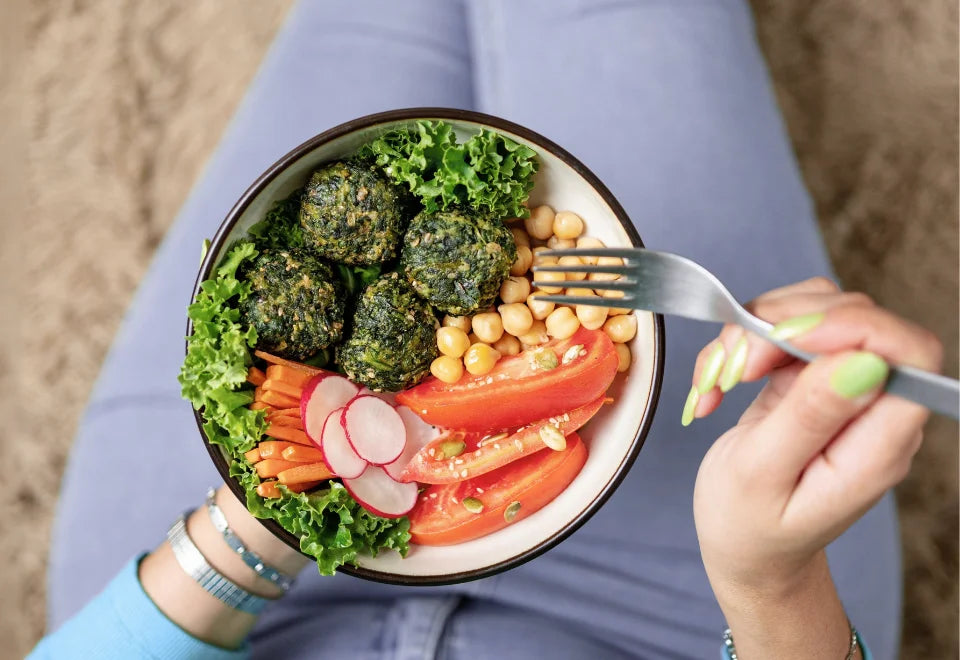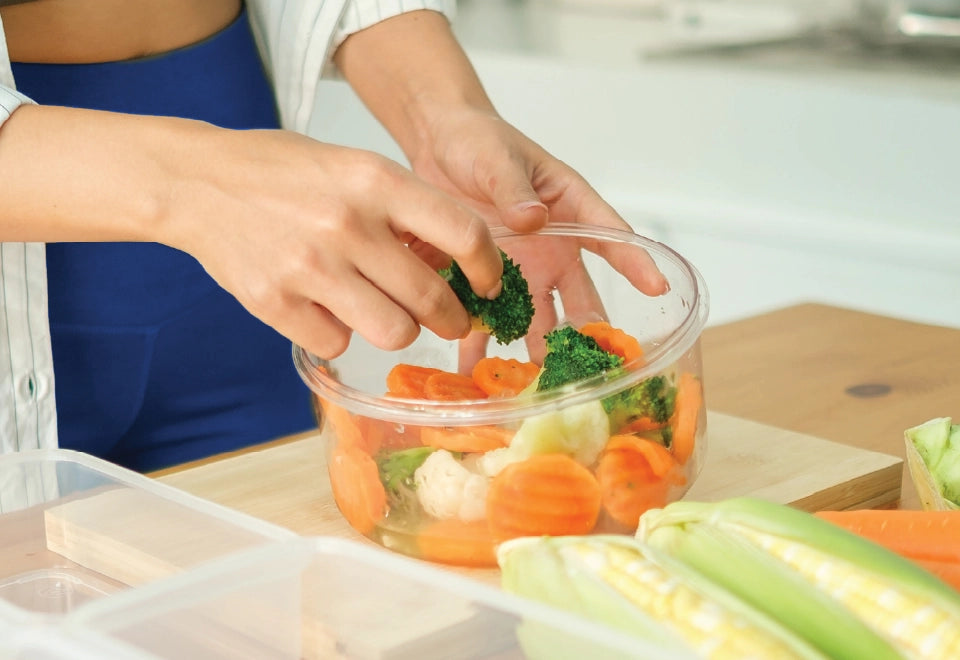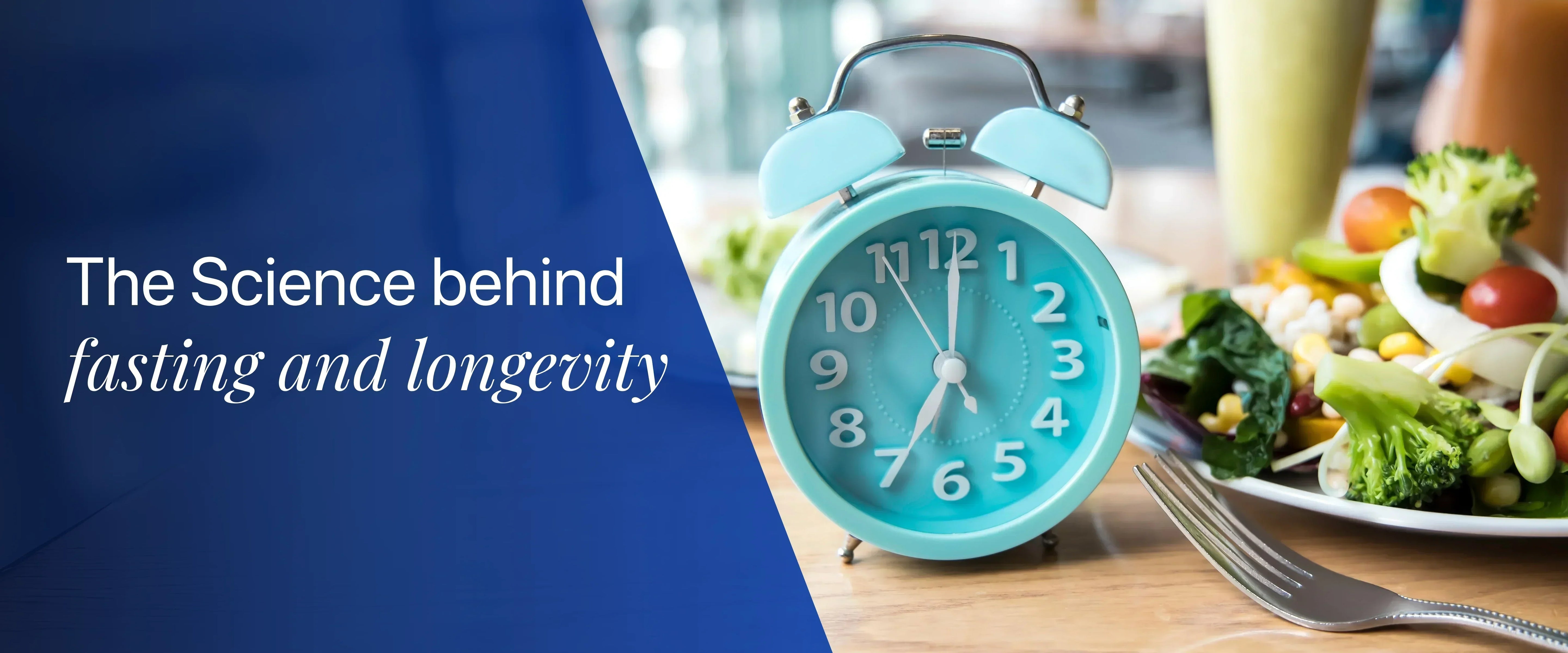People who say that they hate salads haven’t tried a good one! Salads when made right can be tasty, healthy, colourful and fun! They are healthy, packed with all the right nutrients and are super versatile- which means they can be made and tailored according to your needs and taste.
Why Salads Are More Than Just Greens:
Experts say that humans need to include about 2-3 cups of vegetables and 2-2 ½ cups of fruits every day in their diet. But most of our diet doesn’t meet this requirement.
Salads are considered superfoods as they are packed with whole food ingredients ranging from- fibre, vitamins, minerals, carbohydrates and proteins. Furthermore, these nutrients can help the immune system, lower inflammation, and defend the body from chronic disease. However, it is important to note that these benefits can only be possible if you add the right ingredients to your plate.
Total Time: 20minutes
⏱️Preparation Time: 10 minutes
⏱️Cook Time: 10 minutes
🍽️Serving: 4 servings
Ingredients of Super Food Salad
For the Base:
- 3 cups Arugula/Kale
- 1 cup Carrots
- 3 Celery stalks
- 1 Can Chickpeas, Boiled
- 1 Clove Garlic
- ½ cup Mint, Fresh
- ⅓ cup Raisins or currants
- ½ Red onion
- ⅓ cup Walnuts
For the Dressing
- ¼ cup Lemon juice
- 2 tbsp Maple syrup
- 3 tbsp Tahini
- ⅓ cup Olive oil
- 2 tbsp Red wine vinegar
- 1 tsp Cumin
Spices
- ½ tsp Black pepper, Ground
- ½ tsp Sea salt
Supplement:
Whip Up a Nutrient-Packed Superfood Salad in Just 20 Minutes
This super delicious salad is very easy to make and doesn't take much time.
- Start by washing/chopping/preparing all of your vegetables.
- Next, add all of your salad ingredients to a large bowl. Set aside.
- In a smaller bowl, add all of the dressing ingredients. Mix well to combine. Taste and adjust seasonings as desired.
- Pour the dressing over the salad, and toss well.
- Add one scoop of NMN100 to the bowl, mix well and Enjoy!
- Store any leftovers in an airtight container for up to three days. If meal prepping, store the arugula separately from the rest of the salad. It should stay fresh this way for up to one week!
Boost Your Salad with NMN Powder for Extra Health Perks
Adding NMN 100 powder to the superfood makes it even healthier, enhancing the benefits of the salad. The benefit of adding NMN to your food:
- Improved bioavailability: Allows for faster absorption without passing through the digestive tract. That is, there will be greater immediate benefits.
- Customize the amount of NMN: In contrast to capsules, which are pre-measured, powders can be weighed precisely. This enables adjusting the dose to individual needs.
- Enhanced DNA Repair: NMN activates the PARP and SIRT genes, which are in charge of DNA repair. It protects the DNA from harm by increasing NAD+ levels.
- Improved Endurance Levels: With increased mitochondrial activity and greater NAD+ levels, your energy levels will improve.
- Cardiovascular Fitness: Enhances mitochondrial function, capillary density, and blood flow.
- Improve your oral microbiome: With powders that can be sublingually absorbed, direct benefits are seen in the improvement of the oral microbiome, preventing cavities.
- Preventing Age-Related Weight Gain: Research has indicated that NMN can help prevent age-related weight gain by increasing lean muscle mass and decreasing fat levels.
- Anti-ageing advantages: Improved DNA repair, cardiovascular fitness, and muscular strength all contribute to your general well-being and help you live a longer life.
The Everyday Super Salad: Delicious Ways to Load Up on Nutrients
Salads are renowned for their nutritional benefits and are often considered a staple in a balanced diet. Packed with an array of vitamins, minerals, and dietary fibre, salads can contribute significantly to your overall well-being. Some of the key nutritional health benefits of salads include:
Abundance of Micronutrients:
Salad greens are known for their abundance of vitamins A, C, and K. Leafy greens like spinach and kale are rich in vitamin K, vital for bone health, while bell peppers provide a healthy dose of vitamin C, which supports the immune system. Carrots, often found in salads, are high in vitamin A, essential for eye health. A colourful mix of veggies ensures you get a wide range of nutrients, promoting overall well-being. They also contain minerals like potassium, magnesium, and folate, which are crucial for maintaining overall health.
Rich Source of Dietary Fiber:
Salads are an excellent source of dietary fibre, crucial for digestive health. Fiber aids in regulating bowel movements, preventing constipation, and supporting a healthy gut microbiome. Additionally, it helps control appetite and can contribute to weight management by promoting a feeling of fullness and reducing overeating. High-fiber dietary regime has been consistently shown to increase the microbiome alpha diversity and short-chain fatty acids (SCFAs)-producing bacteria in the human gut. SCFAs are the main players in the interplay between diet, microbiota, and host health. It also helps reduce inflammation and improve your microbiome composition.
High in Antioxidants:
Many salad components are bursting with antioxidants, which play a crucial role in protecting your body from oxidative stress. Leafy greens like spinach and arugula contain high levels of antioxidants, such as beta-carotene and lutein. These compounds help fend off harmful free radicals, potentially lowering the risk of chronic diseases and promoting a youthful, healthy appearance.
Hydration:
Stay hydrated effortlessly by including water-rich vegetables like cucumbers and tomatoes in your salads. The natural moisture content of these ingredients not only contributes to your daily hydration needs but also keeps your skin glowing and your body functioning optimally.
Weight Management:
Salads are a dieter's delight. Packed with nutrients and low in calories, they offer a feeling of fullness without the added calories and unhealthy fats that can come with other meal options. By incorporating lean proteins like grilled chicken or tofu, and healthy fats like avocado or nuts, you can create a satisfying, balanced salad that supports your weight management goals.
Potential Disease Prevention:
Regular consumption of a diverse range of vegetables and fruits in salads has been associated with a reduced risk of chronic diseases, including heart disease, certain types of cancers, and obesity. The fibre, vitamins, minerals, and antioxidants present in salads work synergistically to promote overall health and disease prevention.
Counting Calories? This Superfood Salad is Your Tasty, Guilt-Free Choice
The salad is low in calories and a perfect solution for anyone who wants to begin their weight loss journey. To make a salad fit your calorie goal for the day you can play around with various factors such as:
Add Protein:
Including some lean protein in your diet might help you feel satiated for longer. Salads can be topped with fish, eggs, or skinless poultry. Meats are loaded with high-quality protein and are rich in vitamins and minerals. Eg: 3 ounces (84 grams) of baked chicken breast has 26 grams of protein for less than 140 calories! For a vegetarian quick-fix, you can replace the meats with tofu, beans and legumes such as chickpeas, black beans, or kidney beans. Almonds and walnuts are high in protein and include healthful fats. For example, Tofu contains 12–20 grams of protein per 3.5-ounce (100-gram) serving.
Add Whole grains:
Some of the popular salad bases or toppings include cooked brown rice, quinoa, barley, oatmeal, etc. These grains level up the texture, taste and nutrition of your salad. Whole grains are high in fibre, vitamins, minerals, protein and other healthy plant components. A cup of brown rice can provide up to 5 grams of protein and more than 3g of fibre. Studies have shown various benefits of incorporating whole grains into your diet can lower your risk of heart disease, stroke, obesity, type 2 diabetes, and chronic inflammation and support healthy digestion.
Incorporate Seafood:
Adding seafood to your salad can improve its nutrition and flavour. Seafood species such as salmon, cod shrimp, lobster, sardines, tuna and mackerel are loaded with high-quality protein, iodine, vitamins, minerals and fats. Fish also boosts your omega-3 fatty acids which are important for optimal body and brain function. You can opt for omega-3 fatty acid supplements from micro-algae and Vitamin D. Studies have shown that incorporating seafood can lower your risk of heart attacks and stroke and maybe reduce your risk of autoimmune disease. The most nutritious ways to prepare seafood for salads are baking, broiling or grilling.
Salad Boredom Be Gone!
Tips to Keep Your Salad Fresh, Fun, and Flavorful for your Longevity.
While eating a salad every day can seem to be boring and monotonous, you can always top it up by playing around with the ingredients and the dressing. With all the permutations and combinations you can create an infinite number of healthy recipes making you feel better from within. This recipe is a quick easy recipe for those who want to strengthen their immunity! Packed with superfoods like chickpeas, arugula, red onions, raisins, garlic and spices that are rich in vitamins, calcium, iron, healthy fats, and antioxidants. The goodness of superfoods is topped with the NMN powder to boost your energy levels!
FAQs
How often you should eat superfood salad?
The frequency of consuming a superfood salad depends on your personal preferences and dietary goals. Superfood salads are generally nutrient-dense and provide a variety of health benefits. You can incorporate them into your diet as often as you like. Many people choose to have them as a regular part of their meals, such as lunch or dinner, several times a week. However, it's essential to maintain a balanced diet and not rely solely on superfood salads for your nutrition.
Can superfood salad be eaten with meals?
Yes, superfood salads can be eaten with meals. They make excellent side dishes or main courses depending on the ingredients and portion size. Including a superfood salad with your meals can add extra nutrients, fibre, and flavour to your diet. You can enjoy them alongside protein sources like chicken, fish, or tofu, or as a stand-alone meal by adding ingredients like quinoa, nuts, and a variety of vegetables.
Does NMN Powder really help in healthy ageing?
NMN (Nicotinamide Mononucleotide) is a molecule that has been studied for its potential role in promoting healthy ageing. Some research suggests that NMN may support various cellular processes, including those related to energy metabolism and DNA repair. It is believed that these effects may contribute to overall health and longevity.
Where to Buy NMN Powder?
You can order the products through our official website decodeage.com




























Leave a comment
All comments are moderated before being published.
This site is protected by hCaptcha and the hCaptcha Privacy Policy and Terms of Service apply.